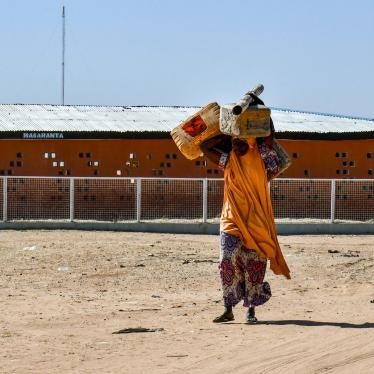The Rwandan government has violated the basic rights of tens of thousands of people by forcing them to abandon their homes in rural areas and move to makeshift dwellings in government-designated sites, Human Rights Watch charged in a report released today.
The government's massive plan to reorganize life in the rural areas, known as the National Habitat Policy, decreed an end to Rwandans' customary way of living in dispersed homesteads. Many homeowners were forced to destroy their own homes and many families lived for more than a year in hovels made of sticks, mud, and banana leaves.
Some who resisted the plan were punished with fines or jail terms, the Human Rights Watch report says. The 91-page report, "Uprooting the Rural Poor in Rwanda," says that from early 1997 through the end of 2000 hundreds of thousands of Rwandans living in Kibungo, Mutara, Kigali-rural, and Ruhengeri provinces left their homes for the sites. Ninety percent of Rwandans live in the countryside and are supposed to be affected by the policy.
"The Rwandan government has caused terrible suffering for the poor people out in the hills," said Alison Des Forges, Senior Advisor to the Africa Division of Human Rights Watch. "It has also made many people angry at a time when opposition political movements are growing among Rwandans inside and outside the country."
The policy has affected both the minority Tutsi, the people targeted by a genocide in 1994, and people of the majority Hutu ethnic group. The genocide and a simultaneous war between the then government of Rwanda and the Rwandan Patriotic Front left many widows and orphans. According to the report, many households headed by these women and children have suffered most from the enforced relocation.
Commenting on the absence of substantial protest against the relocation, one Tutsi widow told Human Rights Watch researchers, "You can't expect us to sleep with an empty stomach and then have the strength to complain." Using the Kinyarwanda term for the government-designated sites, she continued, "We need to deal with living in the umudugudu just like we deal with losing members of our family."
Many donors knew money given to resettle refugees who returned from exile beginning in 1994 also facilitated the rural reorganization that forced tens of thousands of people from their homes, but they continued nonetheless to deliver millions of dollars of aid.
While implementing the relocation, government authorities ordered landholders to divide their lands with returnees or even to cede them all their fields. Those who gave up all their land moved to the government-established sites where they now have only small gardens. In some cases, military officers or businessmen with government connections have appropriated large holdings of land from the poor, a practice purportedly justified by the supposedly greater productivity of larger holdings. The government is now focusing on reforming landholding rather than on forcing further villagization. It is proposing to eliminate all the small holdings of millions of poor farmers and is seeking international funding to pay for this.
"Making agriculture more productive is imperative, but progress towards that laudable goal must not be made at the expense of the human rights," said Des Forges. "Donors seeking to support beneficial change in Rwanda must consider how proposed reforms will affect the lives of all Rwandans."





